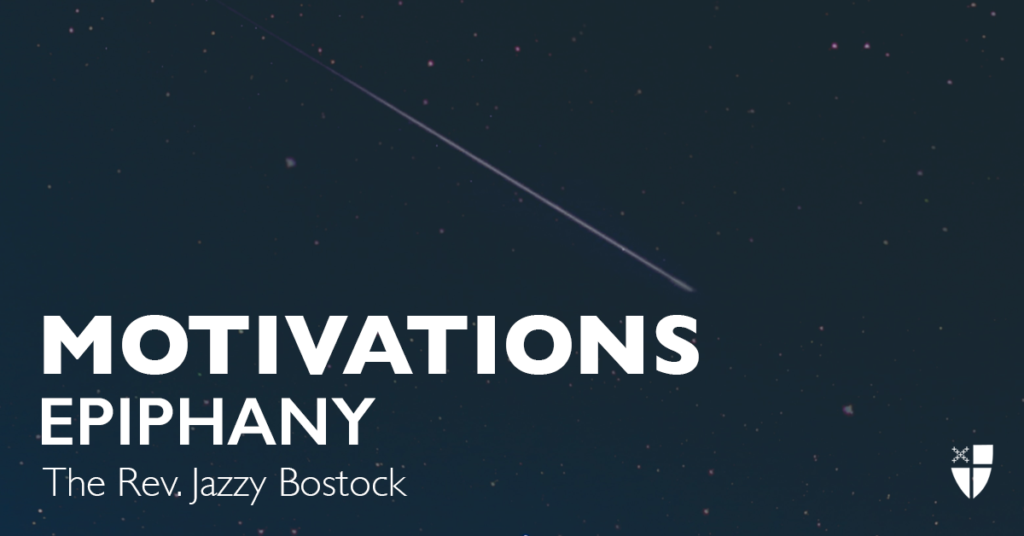Motivations, Feast of the Epiphany – 2020
January 06, 2020
[RCL]: Isaiah 60:1-6; Psalm 72:1-7,10-14; Ephesians 3:1-12; Matthew 2:1-12

Perhaps some of you are familiar with pantomimes – a type of stage play that engages the audience, by encouraging either loud shouts of “Hooray!” for the good guy, or exclamations of “Booo!” for the obvious bad guy. Pantomimes have simple plots and simple characters who seem to need help seeing what is right in front of them. The audience often yells things like, “He’s behind you!” in trying to warn a favorite character of something bad about to happen.
Today’s gospel reading strikes some similarities to a pantomime because the characters seem so one-dimensionally obvious – at least, they do to us as outside observers. We have Herod, the obviously bad character – wise men, who seem like unsuspecting good guys – and right in the middle of them, creating the conflict, a sweet little baby, with a star above the barn where he sleeps. As Herod is speaking to the wise men in this passage, it might feel like watching a pantomime – wanting to yell, “Watch out! He’s behind you!” Or even more simply, “Boooo!”
What makes Herod so bad? What motivates him to be this evil king? Fear. Herod is motivated by a fear which has gripped his heart and is strangling the air from his lungs. He fears that what has been prophesied about this baby will be true – and that his power will be compromised, even by a little child. This fear calls out the very worst in Herod – as it does in us. He becomes obsessed – wanting to entice the wise men to come back and tell him where this baby is.
It is curious that Herod doesn’t go himself – he could have controlled his own results if he went on this journey himself – and yet he doesn’t. Is that motivated by his fear, too? So terrified of this little baby and what he might mean, the threat he might bring to the monarchy and the power of the throne, Herod can’t bring himself to go and visit an infant.
The wise men, for their part, are equally important to this story. They are called in secret by Herod and sent to Bethlehem. These three wise ones follow the star, which would mean they traveled largely in the dark. In the deep blue midnight skies, they walked and walked, following this star because Herod had ordered them to do so. They finally arrived at the stable where Jesus was, and they were “overwhelmed with joy”.
When they enter the stable and see Mary and Jesus, they kneel and offer him their gifts. How long did they stay there, gazing with adoration at the newborn and his mother? Did they bed down in the hay alongside this little family – with ox and cattle to warm them, waking throughout the night by the cries of the infant Jesus?
At some point, the wise ones are given a dream. Is it a dream the three of them share? Or is it just one of them, with the others having to trust the insight? Either way, this dream is like the lightbulb going on. Suddenly, there is an understanding of who Herod really is – and they decide to leave by a different road and go straight back to their own homes.
What allows these three visitors the wisdom to listen to this dream? Herod is motivated by fear – and maybe these three visitors are motivated by love. They have been to visit the infant Jesus, who is love incarnate – and it has transformed their whole lives. They are no longer manipulated by an evil king; they are able to see his motivations clearly and make their own decisions about what they will do.
From this well-known story, perhaps we learn a new thing this morning by looking at the motivations each character holds, by seeing this as a pantomime playing out before us. While it’s easy to see the forces acting on characters outside of us – forces from both their external and internal environment – our own motivations are often not so clear.
There are many parts to our own decision-making, many factors of motivation. Like Herod, we can be motivated by fear: fear of failure, fear of the unknown, fear of change – these are just some of the major fears we all face daily.
We might also be curious, as the wise ones were. Willing to go on an adventure, even though we don’t know exactly what it might entail. Perhaps we have also traveled many miles by night, following a small star in the night sky.
In this story, we are given a gift – we can come with the wise ones to worship Jesus, and those forces of fear and control which have been acting upon our lives are seen for what they are. In a moment of clear vision, we can see the truth and choose to follow Love incarnate. When we make the choice to follow that Love, we are changed. We are transformed. We are overwhelmed by joy and finally, blissfully, free. Amen.
Don’t forget to subscribe to the Sermons That Work podcast to hear this sermon and more on your favorite podcasting app! Recordings are released the Thursday before each liturgical date.
Receive Free Weekly Sermons That Work Resources!


